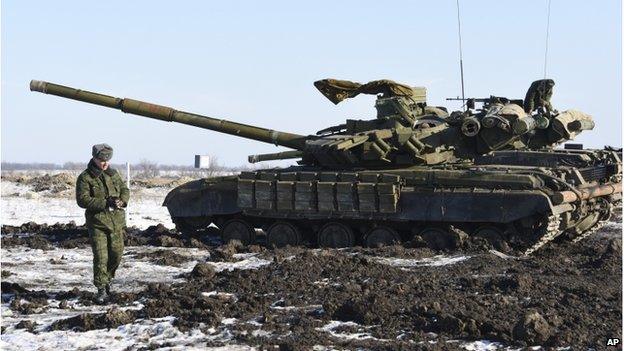Global conflicts to dominate Davos agenda
- Published

The crisis in Ukraine was indentified as one of the main risks to global stability
The risks posed by global conflicts will be at the top of the agenda when politicians and industry leaders meet in Switzerland next week.
Unlike previous years, when the economy took centre stage, geopolitical concerns will be the hot topic at the World Economic Forum (WEF).
Participants from more than 140 countries are expected to attend.
Almost 900 experts identified, external protracted global disputes as the "major threats affecting mankind".
Conflicts in Ukraine and the Middle East were singled out as being of particular concern.
Environmental threats, including water shortages and the spread of infectious diseases, have also been highlighted in the WEF's annual Global Risks report.
In its presentation to the press, the WEF stressed that more than "25 years after the fall of the Berlin Wall," interstate conflicts, and "relics of the Cold War" were now the most likely risks to global stability.
Espen Barth Eide, a former Norwegian defence minister who worked on the report, said the conflicts that posed the biggest risks were not constrained to "direct shooting".
Mr Eide said "major power plays", such as the situation between Russia and Ukraine, were of concern, as were strained relations between Asia's two biggest economies - Japan and China.
He referred to 2014 as the "annus horribilis" of global politics, and warned that for the first time in many years, politics was encroaching on economics and global trade.
Sanctions, such as those imposed on Iran and Russia by Western states, were impinging on business, he added, as was a resurgence of protectionism.
Other risks identified in the report include extreme weather events, the failure of national governance, and rising unemployment.
The threat of cyber attacks, as highlighted by the recent hack of Sony Pictures, and the "increased vulnerability of classified information" were also given prominence by the WEF trend-setters.
"Our appeal [to policy makers] is to invest more into co-operation and diplomacy," Mr Eide told reporters.